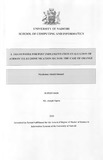| dc.description.abstract | Customer Relationship Management (CRM) systems aid organizations in managing customer interactions more effectively and efficiently. Like many new technologies, CRM has been accompanied by vendor hype and stories of implementation failure. Telecommunication companies are playing a key role in generation of capital that is injected in world economies. In light of this, eCRM is a technology whose time has come and many organizations view it as a tool which comes with competitive advantage as well as a boost to their financial capabilities.
Since telecommunications companies inject colossal sums of money in automation of their processes, it calls for concerted efforts to ensure that the newly inaugurated projects do not fail. This calls for extreme care not only during project implementation stage, but also implementation process which determines the success or failure of the entire project. eCRM technology, having been embraced in recent years, and more so in developed countries, there is need for more theoretical understanding of implementation frameworks that suits implementation of eCRM systems in developing countries.
The main objective of this research is to come up with a framework for eCRM implementation in telecommunications' companies in developing countries, as existing ones were designed for developing nations. The other three objectives are to investigate the effects of Institutional Influence, Peer Influence and Supervisory Authority Influence on eCRM implementation in Telecommunications companies and the last one is to study key frameworks used in implementation of eCRM systems in other countries.
A Case Study approach is adopted to aid this research come up with an informed opinion about the research questions that touch on the above objectives. The independent variables in this research are Institutional Influence, Peer Influence and Supervisory Authority Influence whilst the dependent variable is eCRM implementation. The results of this study show a significant relationship between the dependent and independent variables sighting the moderators i.e. Perceived Environmental Uncertainties, Perceived Gain in Competitive Advantage, Availability of Resources, Top Management Support, IT Capability and Cultural Acceptability that playa crucial role in ensuring that eCRM implementation is successful.
The results obtained in this study reveal that the moderating factors affect the su'ccess of eCRM implementation and the independent variables, Institutional Influence, Peer Influence and Supervisory Authority Influence do also have a great significance. This research adopts a novel approach of developing a framework then coming out after a detailed research analysis of the research instrument with an implementation framework for eCRM systems in telecommunication companies in developing countries. | en_US |

